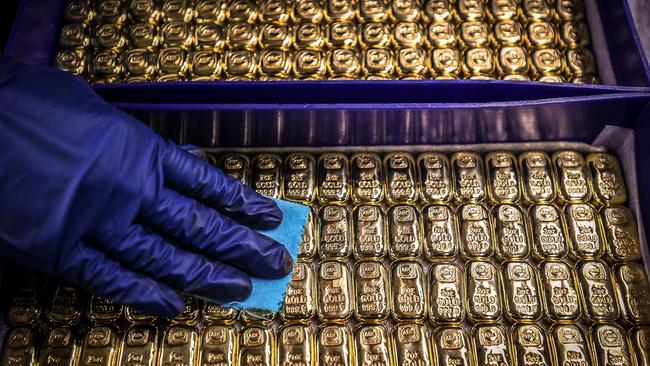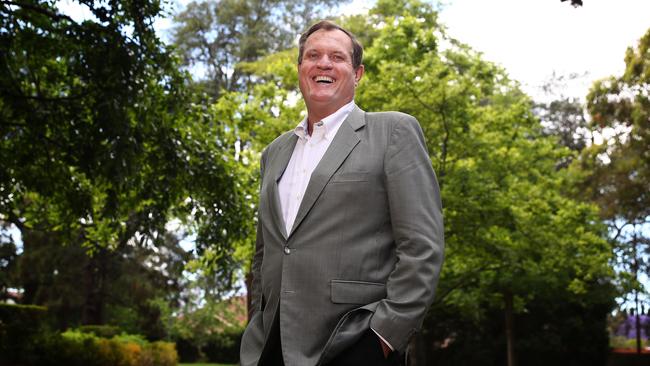
For 14 years the ATO ignored a GST loophole in gold that reduced state revenue by at least $1bn, and almost certainly many times that figure. And the fraudsters diverted some of their $1bn-plus haul into terrorism financing.
Arguably it is Australia’s largest unpunished crime. But instead of chasing the fraudsters the ATO almost wiped out a thriving, largely innocent, privately owned gold refining industry and spent $40m in legal fees chasing an insolvent gold refiner as a cover-up. There was no money to be obtained if they had they won the “gold case” in the courts.
The ATO might have succeeded but for the legal financing of a number of families linked to ABC Refining, which survived the tax office onslaught.
While long-term the “gold case” decision against the ATO in the Federal Court case was a huge victory for tax collection fairness in the nation, almost certainly the states will require return of the $1bn-plus of their revenue that was lost through ATO incompetence; the broken refiners may seek large sums in damages and many skilled workers in the industry will also have a case for damages.
It was a vital win for the nation because the methods used to destroy gold refining were very similar to that used to decimate Australian research years earlier.
The Australian government now understands that entrepreneurship generates employment but their efforts will be thwarted unless they fix the tax collection and enforcement system.
I have been writing about unfairness and injustice in small and medium enterprise tax collection for six years. My first commentary on the “gold case” was on December 6, 2016 under the heading “Crooks exploit legal loophole in multi-million-dollar gold scam”. It took four more commentaries and almost five months before, in April 2017, the ATO finally closed the loophole, which had first been exposed and fixed in other countries around 2003.
Learning the lesson
Tax commissioner Chris Jordan may not have understood the true situation but now has the confidential full Federal Court judgment.

The ATO attack on the gold refiners began in 2016 — almost a year before the loophole was blocked. The ATO began issuing refiners with enormous retrospective GST bills boosted by penalties and interest. They also froze their GST refunds.
The combined thrusts sent most refiners (outside the WA government-owned Perth Mint) into insolvency and destroyed most of this high-skilled industry.
There will be calls for a royal commission into the affair but that will delay the urgent task of fixing the broken tax collection and enforcement system. Rather I suggest the government simply ask the Federal Police to examine the ATO files, which surely will show the truth.
I have compiled an analysis of the key ATO actions in gold and how they illustrate the unfairness of the current workings of the tax collection and enforcement system.
• Action One: The criminal syndicates, having been paid the market price for gold plus GST, disappeared and never refunded the GST to the government. In chasing the refiners the ATO’s enormous retrospective GST assessments ranked above all other creditors, so it immediately sent the refiners to the wall. In addition, somehow banks got wind of what was going on and withdrew their credit. This was the same unfair technique that is often used to send small and medium enterprises to the wall.
Remedy: The assessments should not be legally enforceable until the appeal process is completed.
• Action Two: In all gold markets around the world gold must be 99.99 per cent pure and in bar form to be sold in the investment and jewellery markets. Gold that does not reach that standard must be refined. The ATO declared that when gold was close to 99.99 per cent pure it had already been sufficiently refined, so refiners were not “refining” at all.
The ATO declaration on the way refiners should act was totally different to the way all other global refiners worked, including the Perth Mint. To me it was a complete nonsense.
Remedy: The ATO should not set itself up as an expert on matters where it has no knowledge.
• Action Three: The refiners first appealed to one of the ATO internal appeal bodies. And guess who chaired that body? None other than the main author of the ATO refining blueprint. Accordingly the “kangaroo court” boldly declared that the ATO was right and that the refineries were not refining gold. The internal appeal system in the ATO sometimes works well but often the people on the appeal board are too closely linked to the assessment team or other ATO staffers.
Remedy: The appeal processing system must be totally separate from the ATO itself. There must be no connection whatsoever.
• Action Four: The case went to the Administrative Appeals Tribunal. It then took 15 months for a decision and then that was reversed by the full Federal Court.
Remedy: The appeals system has to be made much faster because the ATO debt hangs over the enterprise. And the failure of Administrative Appeals Tribunal outcome in the gold case means in future many disputes will go straight to the Federal Court.
• Action Five: The ATO won the Administrative Appeals hearing partly via a dramatic revision of the way GST was to be collected in Australia, because it meant that if one person in the supply chain did not refund their GST then all those in the supply chain were vulnerable. That would have caused chaos in the tax system.
Remedy: the consequences of the mechanisms used to make tax assessments have to be reconciled with the national system, not just as a quick legal fix to win a case.
• Action Six: Finally, four years and six months after the false GST assessment, justice for a former refiner was received in the Federal Court. It will be some time before we see the reasons but at least from the outside the ATO actions in devising its own refining procedures simply did it meet the “pub test”. Nor did the expenditure of $40m in legal fees to chase a company that was insolvent.
Remedy: much greater scrutiny of ATO court actions.
• Action Seven: In parliament the ATO justified its actions on the basis that there was criminal behaviour in the refining industry. But in the Administrative Appeals Tribunal case the ATO declared there was no criminal behaviour by the refiners involved in the case.
I know that Treasurer Josh Frydenberg and Assistant Minister to the Prime Minister Ben Morton plus Small Business Minister Michaelia Cash understand the need for fundamental tax collection and enforcement systems change. But they are being lobbied from the ATO and Treasury.
One would hope that the “gold case” finally ends the validity of that lobbying.






The defeat of the Australian Taxation Office in the “gold case” illustrates everything that is wrong in the broken Australian small and medium-sized enterprise tax collection and enforcement system.